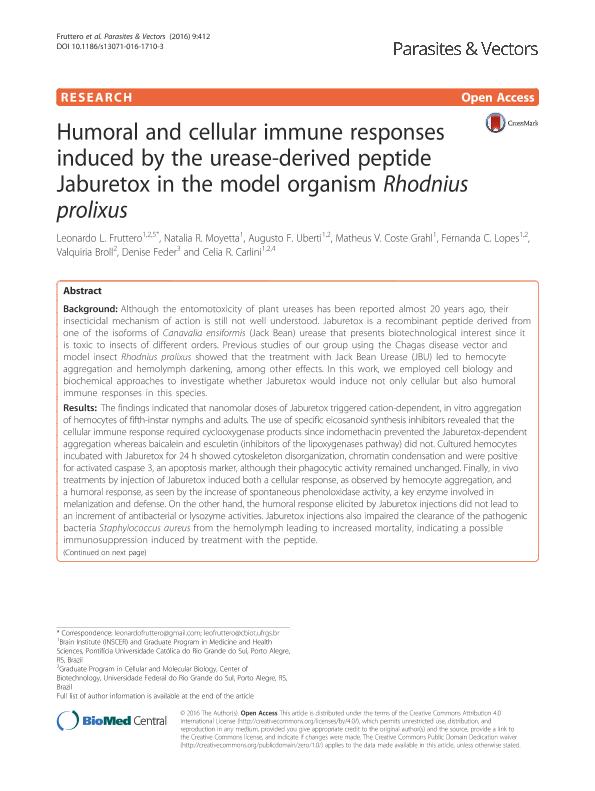Artículo
Humoral and cellular immune responses induced by the urease-derived peptide Jaburetox in the model organism Rhodnius prolixus
Fruttero, Leonardo Luis ; Moyetta, Natalia Rita
; Moyetta, Natalia Rita ; Uberti, Augusto F.; Grahl, Matheus V. Coste; Lopes, Fernanda C.; Broll, Valquiria; Feder, Denise; Carlini, Celia R.
; Uberti, Augusto F.; Grahl, Matheus V. Coste; Lopes, Fernanda C.; Broll, Valquiria; Feder, Denise; Carlini, Celia R.
 ; Moyetta, Natalia Rita
; Moyetta, Natalia Rita ; Uberti, Augusto F.; Grahl, Matheus V. Coste; Lopes, Fernanda C.; Broll, Valquiria; Feder, Denise; Carlini, Celia R.
; Uberti, Augusto F.; Grahl, Matheus V. Coste; Lopes, Fernanda C.; Broll, Valquiria; Feder, Denise; Carlini, Celia R.
Fecha de publicación:
07/2016
Editorial:
BioMed Central
Revista:
Parasites and Vectors
e-ISSN:
1756-3305
Idioma:
Inglés
Tipo de recurso:
Artículo publicado
Clasificación temática:
Resumen
Although the entomotoxicity of plant ureases has been reported almost 20 years ago, their insecticidal mechanism of action is still not well understood. Jaburetox is a recombinant peptide derived from one of the isoforms of Canavalia ensiformis (Jack Bean) urease that presents biotechnological interest since it is toxic to insects of different orders. Previous studies of our group using the Chagas disease vector and model insect Rhodnius prolixus showed that the treatment with Jack Bean Urease (JBU) led to hemocyte aggregation and hemolymph darkening, among other effects. In this work, we employed cell biology and biochemical approaches to investigate whether Jaburetox would induce not only cellular but also humoral immune responses in this species. Results: The findings indicated that nanomolar doses of Jaburetox triggered cation-dependent, in vitro aggregation of hemocytes of fifth-instar nymphs and adults. The use of specific eicosanoid synthesis inhibitors revealed that the cellular immune response required cyclooxygenase products since indomethacin prevented the Jaburetox-dependent aggregation whereas baicalein and esculetin (inhibitors of the lipoxygenases pathway) did not. Cultured hemocytes incubated with Jaburetox for 24 h showed cytoskeleton disorganization, chromatin condensation and were positive for activated caspase 3, an apoptosis marker, although their phagocytic activity remained unchanged. Finally, in vivo treatments by injection of Jaburetox induced both a cellular response, as observed by hemocyte aggregation, and a humoral response, as seen by the increase of spontaneous phenoloxidase activity, a key enzyme involved in melanization and defense. On the other hand, the humoral response elicited by Jaburetox injections did not lead to an increment of antibacterial or lysozyme activities. Jaburetox injections also impaired the clearance of the pathogenic bacteria Staphylococcus aureus from the hemolymph leading to increased mortality, indicating a possible immunosuppression induced by treatment with the peptide. Conclusions: In our experimental conditions and as part of its toxic action, Jaburetox activates some responses of the immune system of R. prolixus both in vivo and in vitro, although this induction does not protect the insects against posterior bacterial infections. Taken together, these findings contribute to the general knowledge of insect immunity and shed light on Jaburetox's mechanism of action.
Palabras clave:
Cellular Immunity
,
Humoral Immunity
,
Jaburetox
,
Rhodnius Prolixus
,
Ureases
Archivos asociados
Licencia
Identificadores
Colecciones
Articulos(CIBICI)
Articulos de CENTRO DE INV.EN BIOQUI.CLINICA E INMUNOLOGIA
Articulos de CENTRO DE INV.EN BIOQUI.CLINICA E INMUNOLOGIA
Citación
Fruttero, Leonardo Luis; Moyetta, Natalia Rita; Uberti, Augusto F.; Grahl, Matheus V. Coste; Lopes, Fernanda C.; et al.; Humoral and cellular immune responses induced by the urease-derived peptide Jaburetox in the model organism Rhodnius prolixus; BioMed Central; Parasites and Vectors; 9; 1; 7-2016
Compartir
Altmétricas



